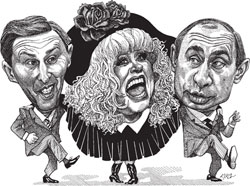
On February, 18th, in Krasnoiarsk there will be a charitable concert dedicated to the memory of Il’ia Kormil’tsev. Due to my many jobs and various duties it was difficult for me to honor the memory of this protagonist of Soviet and Russian rock at the proper time, who died on February 4th last year. The most famous Russian rock-poet, composer of several songs of such groups, like Urfin Dzhius, Nastia and Nautilus Pompilius, translator, literary critic and musicologist, beloved by the whole Soviet and Russian rock-community, Kormil’tsev in the last years provoked stormy discussions due to his political and ideological views; this is particularly evident in his blog at
http://karmakom.livejournal.com, where he wrote until the last day of his life.
For this blog, Kormil’tsev is also important because he, together with Ol'ga Surova, is the author of one of the best articles on rock in Russia: “
Rok poeziia v russkoi kul’ture: vozniknovenie, bytovanie, evoliutsiia”, “Rock poetry in Russian culture: rise, life, evolution” (“Russkaia rok-poeziia: tekst i kontekst”, Tver’ 1998, pp. 4-32). In this article the rock song is considered a particular genre (see p. 4); the authors pay attention not only to the lyrics of rock songs, as it is often the case in the journal where the article is published (see David-Emil’s post about the last issue
http://ps-popular-music.blogspot.com/2007/09/russkaia-rok-poeziia-9.html), but also to music and society. “The aim of the article – the two researchers write – is to try to determine the peculiarity of the rise and life of this genre in our culture and to propose a certain scheme of its evolution” (ib.).
Regardless of his socio-political views, which one does not have to share, Kormil’tsev left an indelible mark on the history of Soviet and Russian rock music, where he occupies one of the most important places.
Inter alia, useful information can be found in
Wikipedia and in the section dedicated to Kormil’tsev of Nautilus Pompilius’ official site
http://www.nautilus.ru/kormiltsev/music/.
Вспоминая Илью Кормильцева
 18 февраля в Красноярске
18 февраля в Красноярске пройдет благотворительный концерт памяти Ильи Кормильцева. Мои многие работы и разнообразные хлопоты меня затрудняли вовремя отдать дань уважения этому герою советского и русского рока, умершему 4-го февраля прошлого года. Самый известный русский рок-поэт, сочинитель многих песней таких групп, как Урфин Джюс, Настя и Наутилус Помпилиус, переводчик, музыкальный и литературный критик, любимый всей советской и постсоветской рок-общиной, Кормильцев вызывал в последние годы бурные дискуссии из-за своих политических и идеологических взглядов; об этом свидетельствует, между пр., его ЖЖ
http://karmakom.livejournal.com/, в котором он писал до последнего дня жизни.
Для этого блога, Кормильцев важен еще тем, что ему принадлежит, в соавторстве с О. Суровой, одна из лучших статей о роке в России: «
Рок поэзия в русской культуре: возникновение, бытование, эволюция» (// «Русская рок-поэзия: текст и контекст» Тверь 1998, сс. 4-32). В этом исследовании рок-песня рассмотрена как особый жанр (см. с. 4); авторы уделяют внимание не только текстам рок-песней, как часто бывает в сборнике, где статья помещена (см. пост Давид-Емиля о последнем выпуске
http://ps-popular-music.blogspot.com/2007/09/russkaia-rok-poeziia-9.html), но и музыке и обществу. «Задача статьи – пишут два исследователя – попытаться определить особенности возникновения и бытования этого жанра в отечественной культуре и предложить некую схему его эволюции» (там же).
Невзирая на его общественно-политические взгляды, с которыми можно и не соглашаться, Кормильцев оставил неизгладимый след в истории советской и русской рок-музыки, в которой ему принадлежит одно из самых важных мест.
Между пр., полезную информацию можно найти в
Википедии и в подразделе официального сайта Наутилуса
http://www.nautilus.ru/kormiltsev/music/ , посвященном Кормильцеву.













